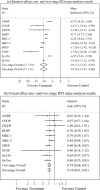Meta-analysis using individual participant data: one-stage and two-stage approaches, and why they may differ
- PMID: 27747915
- PMCID: PMC5297998
- DOI: 10.1002/sim.7141
Meta-analysis using individual participant data: one-stage and two-stage approaches, and why they may differ
Abstract
Meta-analysis using individual participant data (IPD) obtains and synthesises the raw, participant-level data from a set of relevant studies. The IPD approach is becoming an increasingly popular tool as an alternative to traditional aggregate data meta-analysis, especially as it avoids reliance on published results and provides an opportunity to investigate individual-level interactions, such as treatment-effect modifiers. There are two statistical approaches for conducting an IPD meta-analysis: one-stage and two-stage. The one-stage approach analyses the IPD from all studies simultaneously, for example, in a hierarchical regression model with random effects. The two-stage approach derives aggregate data (such as effect estimates) in each study separately and then combines these in a traditional meta-analysis model. There have been numerous comparisons of the one-stage and two-stage approaches via theoretical consideration, simulation and empirical examples, yet there remains confusion regarding when each approach should be adopted, and indeed why they may differ. In this tutorial paper, we outline the key statistical methods for one-stage and two-stage IPD meta-analyses, and provide 10 key reasons why they may produce different summary results. We explain that most differences arise because of different modelling assumptions, rather than the choice of one-stage or two-stage itself. We illustrate the concepts with recently published IPD meta-analyses, summarise key statistical software and provide recommendations for future IPD meta-analyses. © 2016 The Authors. Statistics in Medicine published by John Wiley & Sons Ltd.
Keywords: IPD; individual participant data; individual patient data; meta-analysis; one-stage; two-stage.
© 2016 The Authors. Statistics in Medicine published by John Wiley & Sons Ltd.
Figures


Similar articles
-
Individual participant data meta-analysis to examine linear or non-linear treatment-covariate interactions at multiple time-points for a continuous outcome.Res Synth Methods. 2024 Nov;15(6):1001-1016. doi: 10.1002/jrsm.1750. Epub 2024 Sep 16. Res Synth Methods. 2024. PMID: 39284791
-
One-stage random effects meta-analysis using linear mixed models for aggregate continuous outcome data.Res Synth Methods. 2019 Sep;10(3):360-375. doi: 10.1002/jrsm.1331. Epub 2019 Jan 8. Res Synth Methods. 2019. PMID: 30523676 Free PMC article.
-
One-stage individual participant data meta-analysis models: estimation of treatment-covariate interactions must avoid ecological bias by separating out within-trial and across-trial information.Stat Med. 2017 Feb 28;36(5):772-789. doi: 10.1002/sim.7171. Epub 2016 Dec 1. Stat Med. 2017. PMID: 27910122 Free PMC article.
-
Get real in individual participant data (IPD) meta-analysis: a review of the methodology.Res Synth Methods. 2015 Dec;6(4):293-309. doi: 10.1002/jrsm.1160. Epub 2015 Aug 19. Res Synth Methods. 2015. PMID: 26287812 Free PMC article. Review.
-
Quantifying heterogeneity in individual participant data meta-analysis with binary outcomes.Syst Rev. 2017 Dec 6;6(1):243. doi: 10.1186/s13643-017-0630-4. Syst Rev. 2017. PMID: 29208048 Free PMC article. Review.
Cited by
-
Association of smoking with knee osteoarthritis structural defects and symptoms: an individual participant data meta-analysis.Sci Rep. 2024 Nov 22;14(1):29021. doi: 10.1038/s41598-024-80345-x. Sci Rep. 2024. PMID: 39578564 Free PMC article.
-
Comparative efficacy of interpersonal psychotherapy and antidepressant medication for adult depression: a systematic review and individual participant data meta-analysis.Psychol Med. 2024 Nov 4;54(14):1-10. doi: 10.1017/S0033291724001788. Online ahead of print. Psychol Med. 2024. PMID: 39494789 Free PMC article. Review.
-
Trajectory of Cognitive Decline Before and After Stroke in 14 Population Cohorts.JAMA Netw Open. 2024 Oct 1;7(10):e2437133. doi: 10.1001/jamanetworkopen.2024.37133. JAMA Netw Open. 2024. PMID: 39356504 Free PMC article.
-
Independent and joint associations of cardiometabolic multimorbidity and depression on cognitive function: findings from multi-regional cohorts and generalisation from community to clinic.Lancet Reg Health West Pac. 2024 Sep 12;51:101198. doi: 10.1016/j.lanwpc.2024.101198. eCollection 2024 Oct. Lancet Reg Health West Pac. 2024. PMID: 39308753 Free PMC article.
-
Tuberculosis-Associated Respiratory Disability in Children, Adolescents, and Adults: Protocol for a Systematic Review and Individual Participant Data Meta-Analysis.medRxiv [Preprint]. 2024 Sep 4:2024.09.03.24313003. doi: 10.1101/2024.09.03.24313003. medRxiv. 2024. PMID: 39281764 Free PMC article. Preprint.
References
-
- Berlin JA, Santanna J, Schmid CH, Szczech LA, Feldman HI, Anti‐Lymphocyte Antibody Induction Therapy Study Group . Individual patient‐ versus group‐level data meta‐regressions for the investigation of treatment effect modifiers: ecological bias rears its ugly head. Statistics in Medicine 2002; 21(3):371–387. - PubMed
-
- Riley RD, Lambert PC, Abo‐Zaid G. Meta‐analysis of individual participant data: rationale, conduct, and reporting. BMJ 2010; 340:c221. - PubMed
Publication types
MeSH terms
Grants and funding
LinkOut - more resources
Full Text Sources
Other Literature Sources
Medical

